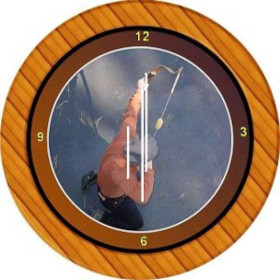I turned Type 1 overnight in 2009 at 38 years old, no one knows why. I am what you might consider an extreme diabetic, my pancreas does not create any insulin at all, and without insulin to inject myself with, the doctor says I'd likely die within 2 days. My blood sugar fluctuates between 100 - 300 like it was nothing, and an A1c in the low sevens would be phenomenal. I usually hover around 8 and the doctor says that's great.
Now, as for archery and hunting...
Take a class on nutrition, to learn the relationship that carbs, sugars, starches, and fats have on your body's metabolization of sugar. I have been to many hours of such training at my doctors office (diabetes center), and it helps a lot. You need to know this, it will help you know what to eat and when to eat it, so you don't have a sugar crash while you're all alone sitting 15 feet up in a climbing stand, strapped to a tree and in need of assistance. (Fortunately for you, it probably is not as severe as that, but that's the stuff I have to keep in mind!)
You probably shouldn't go to McDonald's in the wee morning hours anymore, nor just be content with a bowl of cereal or oatmeal. I find that a healthy and balanced meal keeps me from having sugar issues while exerting myself in the field.
Finger pricks... I test about 8-10 times per day, poke only the end of my fingers (pads, not tips) and have never considered that it could affect my string hand. Reading your first post was the first time it ever entered my mind. That part of it is really a piece of cake.
Always carry a tester and a sugar source with you. I wear an insulin pump, and a continuous glucose monitor, so am a bit more tuned in than you probably need to be, but I would strongly recommend that you keep some candy (Skittles, bottle caps, not fatty candy like chocolate) in your day pack at all times. It is terrible to have a sugar low, be sweating and have your heart pounding, and have to walk a mile to your vehicle for sugar. (And that is very dangerous for me.)
I shoot poorly when my sugars are high (over 250), and when they are under about 100. Once I figured that out, a lot of frustration went away.
Also, I worry less about sugar highs in the field than about lows. With a low, I could pass out and die, but a high would not do that, unless it was extreme.
I did a 13-day float hunt in Alaska in 2003, and it was challenging to manage the diabetes. I had to plan for the worst, and had 4 separate bags packed, each containing a full supply of insulin and all I'd need to survive. We also had a satellite radio to call in a helicopter if necessary. No joke! I had to sleep with all the insulin in my sleeping bag to keep it from freezing at night. I had sugars all the way from 35 to 450 during the trip, and although there were some rough times, I made it out alive! The worst times were when I was in the raft, or packing out meat, and the adrenaline of the situation distracting me from noticing that my sugar was dropping. I ended up getting so sick one day that I had to stay in camp the next day and rest while the other guys hunted.
By the way, this is not intended to be medical advice, and you should talk to your doctor about how to manage your diabetes while engaging in any activity. I guess this is just a peek into the way diabetes has affected me.
By the way, I'm 46 now, 190 lbs, have never been significantly out of shape, and exercise regularly. I play competitive hockey, ride a bike a lot, and exercise all the time just because I like it. Yet even today, with the pump and the continuous monitor, my sugars have fluctuates between 79 and 299 so far, just today. Diabetes is not a death sentence, however severe it may be. This is actually a great time in history to be a diabetic! But it is nothing to sneeze at, either.














